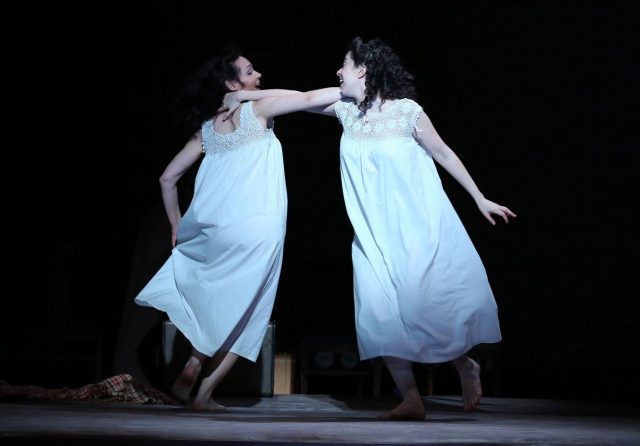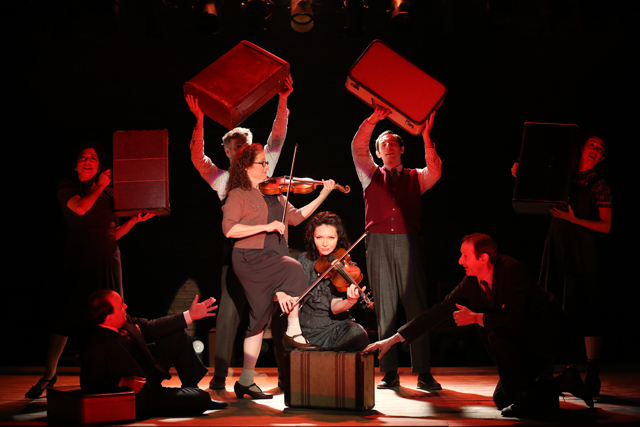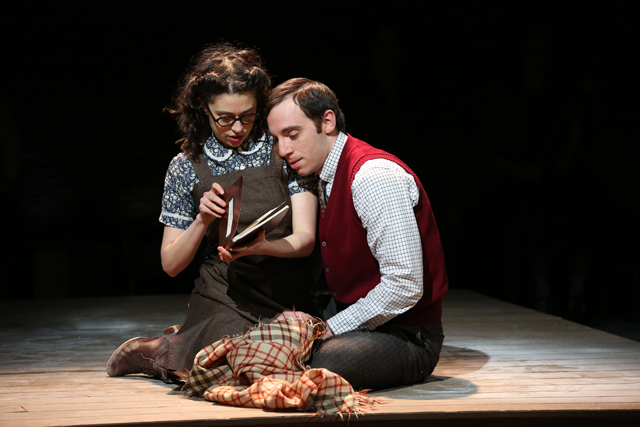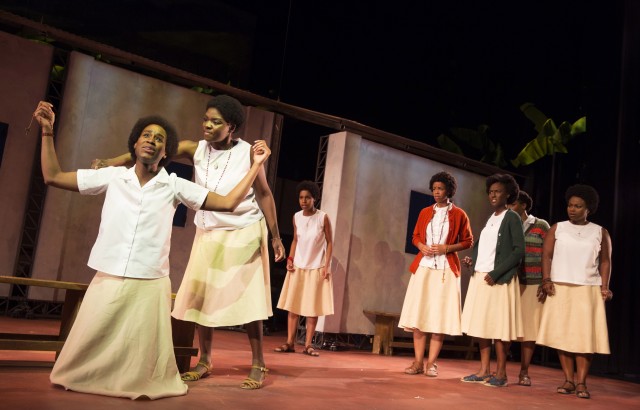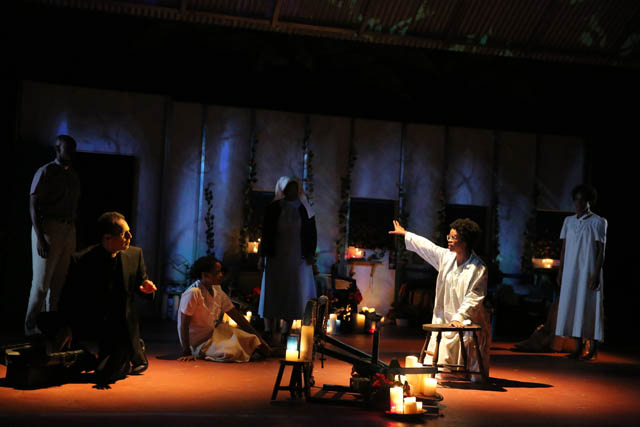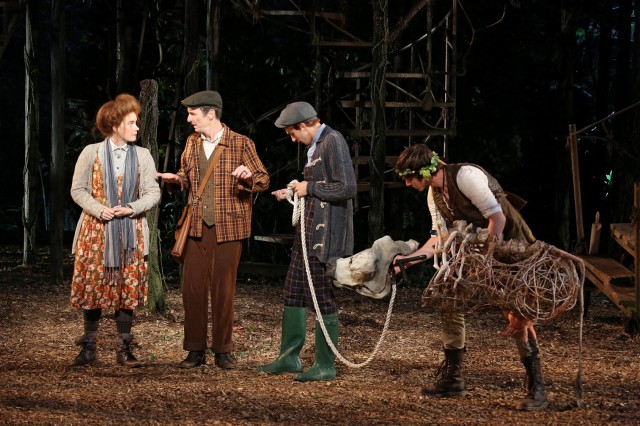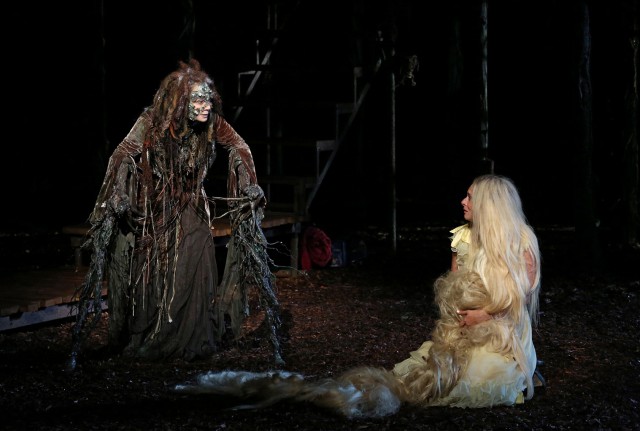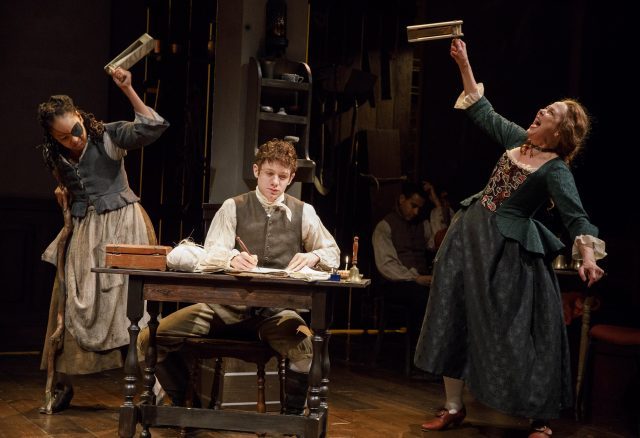
Jim (Chris Perfetti) tries to unbalance the books while being celebrated by Old Tizzy (Crystal A. Dickinson) and Mrs. Trewitt (Harriet Harris) in The Low Road (photo by Joan Marcus)
Anspacher Theater, the Public Theater
425 Lafayette St. at Astor Pl.
Tuesday through Sunday through April 8, $85
212-539-8500
publictheater.org
Pulitzer Prize winner Bruce Norris uses Adam Smith’s 1776 economic epic, An Inquiry into the Nature and Causes of the Wealth of Nations, as the basis for his potent and rollicking The Low Road, running at the Public’s Anspacher Theater through April 8. The Texas-born Norris follows the development of American capitalism through the trials and tribulations of one Jim Trewitt, from his birth in 1758 to the year of independence, 1776. The bitter yet playful satire is narrated by Smith (Daniel Davis), who hovers around the stage and in the aisles as he watches the shenanigans unfold along with the audience when he’s not front and center, using business-speak to introduce scenes. “As the ladies within had no marketable skills to speak of, they set about to purvey the only commodity available to them,” he says about a brothel, where the madam, Mrs. Trewitt (Harriet Harris), and her one-eyed slave, Old Tizzy (Crystal A. Dickinson), have taken in a baby left to them by one “G. Washington of Virginia,” according to a note that also promises they will be “generously compensated” upon the lad’s seventeenth birthday. One day, young Jim (Jack Hatcher) fortuitously comes upon a work-in-progress by Smith, reading a paragraph that will change his life: “Every individual endeavours as much as he can to employ his capital in support of domestic industry. He neither intends to promote the public interest nor knows how much he is promoting it. He intends only his own gain, and he is, in this, led by an invisible hand to promote an end that was never part of his intention. Nor is it the worse for society that it was no part of it.” Jim becomes a master with money, embezzling from Mrs. Trewitt without the slightest bit of guilt, and upon his seventeenth birthday, he (now played by Chris Perfetti) heads out on his own with a hidden stash under his hat. He buys himself a slave, John Blanke (Chukwudi Iwuji), loses a lot more than just his shirt to a mysterious masked thief, gets taken in by Brother Pugh (Max Baker), the presiding elder of the Bible-thumping New Light of Zion Colony of Waterfleet, and courts the daughter (Tessa Albertson) of the fabulously wealthy Isaac Low (Kevin Chamberlin). All the while, he is accompanied by Blanke, who turns out to be a lot more than the “deef . . . substandard product” he thought he purchased.
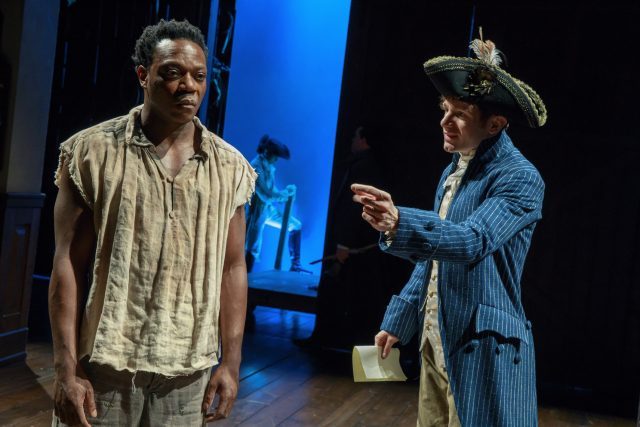
Jim Trewitt (Chris Perfetti) belittles his new slave, John Blanke (Chukwudi Iwuji), in Bruce Norris play at the Public Theater (photo by Joan Marcus)
Tony winner Norris (Clybourne Park, A Parallelogram) fills The Low Road with economic language and potent platitudes that never get tedious or pedantic — and much of which is as true today as it was in Smith’s time, taking on income inequality, class, gender, legacy, luxury, labor, power, property, organized religion, the military, and race. “All profit is theft,” Constance Pugh (Susannah Perkins) declares. “As he considered the disparity betwixt himself and the man whose chamber-pot he presently emptied, he wondered what it should be that caused such divergence of fortune,” Smith says of Trewitt cleaning up after the Duke of Buccleuch (Gopal Divan) at the brothel. “Might I suggest you learn to value that which cannot be obtained at gunpoint?” Blanke tells Jim shortly after they had been shackled together, evoking Sidney Poitier and Tony Curtis in Stanley Kramer’s The Defiant Ones. “You provide commendable service to my men and in return we provide you with protection. Now, surely that’s a fair exchange, yes?” Captain Shirley (Richard Poe) reminds Mrs. Trewitt when explaining why he and his soldiers don’t have to pay for their jaunts with her ladies of the night. “Yet somehow it seemed that, as his authority increased, the affection of those within had diminished proportionally,” Smith says of Jim as he cheats Mrs. Trewitt and her coterie, continuing, “For, their needs were modest, and, as a future gentleman, his were understandably greater.” And just in case the audience doesn’t tune into how modern these ideas still sound, the second act begins with a brilliantly conceived scene that establishes Jim as the founding father of corporate greed.
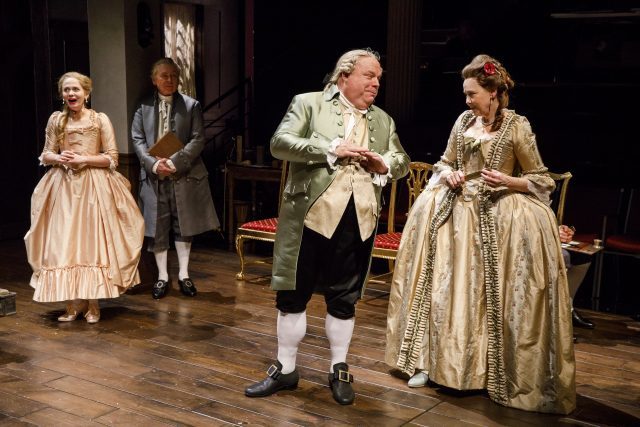
Isaac Low (Kevin Chamberlin) shares his good fortune with his wife (Harriet Harris) as their daughter (Tessa Albertson) and Adam Smith (Daniel Davis) look on in The Low Road (photo by Joan Marcus)
Four-time Tony nominee and three-time Obie winner Michael Greif (Dear Evan Hansen, A Parallelogram) superbly directs a cast of eighteen on the small Anspacher stage, which undergoes numerous changes by scenic designer David Korins, as chairs, tables, beds, barriers, a podium, and other elements are wheeled on and off; a short technical delay the night I went actually gave insight to the complexity behind the staging. Emily Rebholz’s period costumes and J. Jared Janas and Dave Bova’s wig and hair design are right on target, as is live music by violinist Josh Henderson, composed by Mark Bennett. Perfetti (Picnic, Cloud Nine) brings an engaging quirkiness to the role of Jim; you can’t help but root for him even though he does terrible things that will essentially lead to the subprime mortgage crisis of 2008. RSC veteran Iwuji (Hamlet, Hedda Gabler) is ferocious as John Blanke, representing America’s greatest shame and delivering the timeless line “But how much profit does one need? P’raps there ought be some penalty for the accumulation of unseemly wealth.” And Tony nominee Daniel Davis (Wrong Mountain, Talking Heads) lends it all a grand Shakespearean air. Thirty years ago, Gordon Gekko proclaimed, “Greed is good.” Norris ingeniously takes roads both low and high to reveal just how American that concept is, from the birth of the nation to this very minute.

